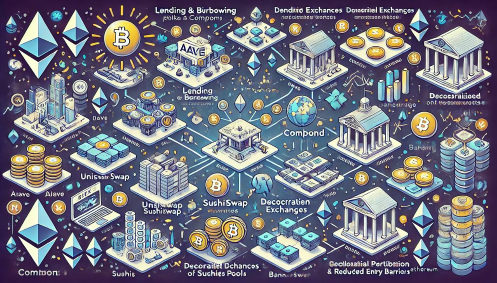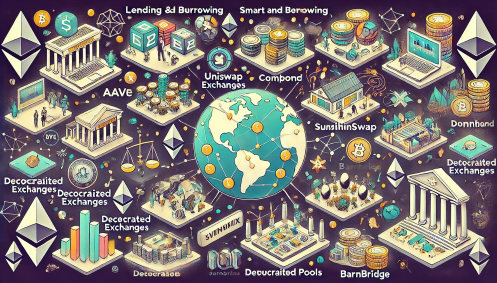
Decentralized finance, commonly known as DeFi, represents a shift from traditional, centralized financial systems to peer-to-peer finance enabled by decentralized technologies built on the Ethereum blockchain. DeFi protocols offer a broad spectrum of financial services, including lending, borrowing, trading, investment, and risk management, without the need for a central authority like banks or financial institutions.
One of the foundational aspects of DeFi is the ability to lend or borrow funds in a trustless environment, where smart contracts replace traditional intermediaries such as banks. These contracts automatically execute the terms of the agreement based on the code. For example, platforms like Aave and Compound allow users to earn interest on their cryptocurrency deposits, or borrow against them, without a middleman. These protocols use liquidity pools rather than matching individual lenders and borrowers, which maximizes capital efficiency and ensures liquidity.
Trading and investment are other critical components of DeFi. Decentralized exchanges (DEXs) such as Uniswap, SushiSwap, and PancakeSwap facilitate the trading of crypto assets without a central order book. Instead, these DEXs use liquidity pools that traders can contribute to, earning transaction fees in return for providing liquidity. This model eliminates the need for an intermediary and reduces the entry barriers for users wanting to offer liquidity.
Another significant aspect of DeFi is the creation of synthetic assets and derivatives. Platforms like Synthetix allow users to create and trade synthetic versions of real-world assets such as currencies, commodities, and stocks, all backed by cryptocurrencies. This expands the reach of DeFi to encompass more traditional financial markets, providing access without the need for traditional brokerage or exchange platforms.

DeFi also includes more complex financial instruments such as options and futures. Protocols like DerivaDEX and BarnBridge address these sophisticated products, providing tools for risk management, speculation, and hedging that were previously only available in traditional finance. These platforms are built to handle the inherent risks of trading derivatives, employing mechanisms to manage collateral and ensure fair and safe operations.
Yield farming is another innovative aspect of DeFi, which involves earning rewards with cryptocurrency holdings by staking or lending digital assets. It has become a popular method for generating returns within the DeFi ecosystem, though it’s not without its risks, including high volatility and impermanent loss.
One of the primary benefits of DeFi is the democratization of finance. By removing centralized institutions and lowering entry barriers, DeFi protocols empower individuals to participate in financial markets directly and globally. However, the DeFi space also carries significant risks, primarily due to its relatively unregulated nature, the immaturity of the technology, and the potential for severe financial loss due to operational vulnerabilities or market manipulations.